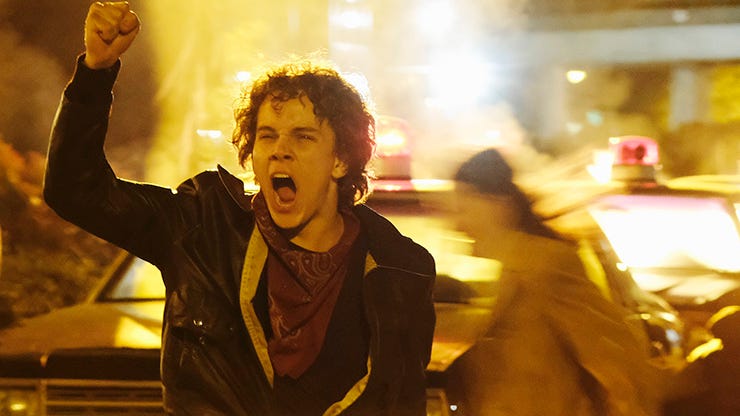Join or Sign In
Sign in to customize your TV listings
By joining TV Guide, you agree to our Terms of Use and acknowledge the data practices in our Privacy Policy.
When We Rise: 5 Powerful, Can't Miss Moments in ABC's LGBT Miniseries
Why it's moving and necessary
When We Rise, ABC's miniseries about the LGBT rights movement, is a big, sweeping story that reminds us how far lesbian, gay, bisexual and transgender people have come in the 40 years since the gay rights movement began.
Today LGBT people are so prevalent on TV that it's sometimes hard to believe they were practically invisible on small screens before Ellen DeGeneres' breakthrough coming out episode in 1997. Through touching stories and powerful images, When We Rise uses four characters to illustrate the blood, sweat and tears that went into making it so that LGBT people can now enjoy freedoms including the right to marry.
LGBTQ representation on TV hits record high, but there's still a ways to go
Brought to the screen by Dustin Lance Black, the Oscar-winning screenwriter of the movie Milk, the eight-hour miniseries is inspired by real events. It is an adaptation of the book of the same name by real-life activist Cleve Jones, who, as the story kicks off in 1972, leaves home for San Francisco partly because his dad (played by David Hyde Pierce) thinks he's mentally ill for being gay. It's in San Francisco that we meet other fiery, passionate young people yearning to find some sense of community, including Roma Guy (Emily Skeggs as a youth and Mary-Louise Parker as an adult) who becomes a women's activist and is married to Diane (Fiona Dourif and Rachel Griffith), a nurse who stepped to the forefront to take care of AIDS patients when the epidemic hit. You'll also meet Ken Jones (Jonathan Majors and Michael K. Williams), a black Navy veteran whose story includes overcoming religious and racial hurdles.
When We Rise creator says the series shouldn't irk the alt-right
The story can get heavy-handed and melodramatic, particularly in the first few installments. You'll lose track of how many times people say "We must fight!" in an impassioned, overly dramatic diatribe. Still, the series is sobering, educational and vital. As Black told members of the press at the Television Critics Association winter previews in January, "I grew up in the South in a religious home, a military home, a conservative home. I love them and I treasure [my family]. I wrote this for my cousins and aunts and uncles and my family, from that 'other America,' to say we've got more in common than you think and we can speak the same language."
There's a lot to take in and digest from When We Rise. Here are some of its most moving moments.
1. Seeing our heroes flock to San Francisco expecting a free-love utopia but finding the opposite
Cleve (Austin P. McKenzie and Guy Pearce), Ken and Roma quickly learn the city's campaign to "clean up" San Francisco means criminalization of gay and lesbian people -- going so far as to break up parties in people's homes and even propose a law that would allow firing gay people in public service jobs, including teachers. It's heartbreaking and shocking.
2. Watching LGBT people suffer violence that goes overlooked and is even encouraged by police
Scenes of bar raids as well as brutal muggings and beatings show how much these kids are up against, and it's inspiring to see how they lean on each other for support and protection.

Austin P. McKEnzie, When We Rise
Eike Schroter, ABC3. Understanding how some LGBT people face double the prejudice -- inside and outside the LGBT community
When We Rise does a fine job of demonstrating, primarily through Ken Jones, the racism within the LGBT community even though everyone is fighting for the same cause. He's shunned from the black community, too, and told "no real black man is a homosexual." There are conflicts between gay men and gay women as well; gay men dismiss the gay women, while within the women's movement, heated debates occur about whether women should use resources for gay men or even allow them into their spaces.
4. Seeing how devastating the assassination of Harvey Milk is -- and how it intensifies the movement
Just when Cleve's friend and mentor Harvey Milk (Dean Hinchey) -- the first openly gay elected official in California -- offers the community a sense of safety and security, he is shot dead by a colleague. We see Cleve discover the body, and as gutting as it is, it sparks major action. After riots, Cleve, among others, doubles down on their political involvement.
5. Feeling the fear, despair and resilience as AIDS emerges
It's chilling to watch as one by one Cleve, Ken and their friends see what is initially seen as a strange rash turns into "gay cancer" and then ends in death. It's puzzling to see Pat (Whoopi Goldberg), a health department official, want to cover up the outbreak out of fear of making gay people more despised than they already were. But it is also heartening to see Diane step up to take care of "untouchable" patients and make the case that the federal government's apathy was genocide. This is the point when the series starts to get gripping. It's where the urgency of their activism can't be ignored, where Cleve is inspired to create what becomes the AIDS Memorial Quilt and these characters' beautiful, tragic stories give us all a lesson on strength and hope.
When We Rise premieres Monday, Feb. 27 at 9/8c on ABC. New episodes will return Wednesday, March 1 after being preempted by President Donald Trump's address to Congress on Tuesday, Feb. 28.
